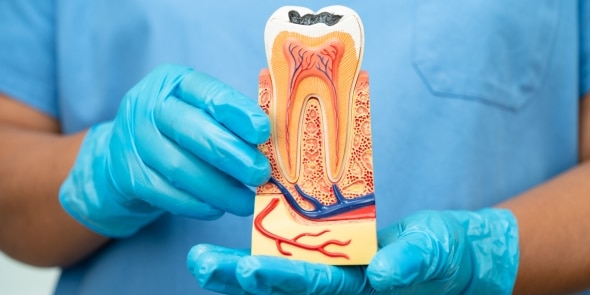Signs You May Need a Root Canal in Austin (and When to See a Dentist)
Experiencing tooth pain or sensitivity? It might be a sign that you need a root canal. Root canals are dental procedures that address deep tooth decay and infection, preventing further damage and restoring dental health. Knowing when to visit your Austin dentist for a root canal is crucial for prompt, effective treatment. In this guide, we’ll explore critical signs for a root canal and why addressing them promptly is essential. Whether you’re experiencing discomfort or want to protect your dental health, here’s everything you need to know about root canals in Austin.
1. Persistent Tooth Pain
- Constant or Throbbing Pain: If tooth pain persists, especially when chewing, it can signal deep decay or infection.
- Nighttime Sensitivity: Pain that worsens at night is often a sign the pulp inside the tooth is compromised.
- Localized Pain: While some pain can feel widespread, root canal pain typically originates from a specific area in the mouth.
2. Extreme Tooth Sensitivity to Temperature
- Sensitivity to Hot or Cold: Sharp pain from hot drinks or ice-cold foods could indicate pulp inflammation.
- Long-lasting Discomfort: When sensitivity lingers long after exposure, it may indicate severe tooth nerve damage requiring a root canal.
- Sudden Changes in Tolerance: If you’ve recently developed sensitivity issues, it’s worth discussing with a dentist in Austin.
3. Swollen or Tender Gums
- Localized Swelling: Swelling or tenderness around a tooth could signal infection.
- Presence of Gum Boils: Small pimples on the gums, known as gum boils, are often signs of abscessed teeth that might need root canals.
- Sensitivity of Gums: Tender gums near the affected tooth could indicate pulp infection or inflammation, requiring immediate attention.
4. Tooth Discoloration
- Darkening of a Tooth: Teeth may turn gray or dark due to decay reaching the inner pulp.
- Internal Staining: Unlike surface stains, internal discoloration often signals compromised blood flow and infection.
- Single-Tooth Discoloration: When one tooth stands out in color, it strongly indicates that decay has reached the pulp, possibly requiring a root canal.
5. Deep Decay or Dental Trauma
- Severe Tooth Decay: Untreated cavities can progress into deep decay, impacting the tooth’s pulp.
- Injury to the Tooth: Dental trauma, such as fractures or cracks, exposes the pulp to infection.
- Immediate Dental Attention: Seeking early intervention in Austin can save the tooth from further damage.
6. Pain While Eating or Chewing
- Painful Pressure on the Tooth: Pain when biting down can be a sign of infection or abscess.
- Difficulty Chewing: Difficulty or discomfort while chewing signals that something is wrong with the tooth structure or pulp.
- Need for Evaluation: Your Austin dentist can determine if a root canal is needed to resolve the pain and restore function.
7. Persistent Bad Breath or Bad Taste
- Chronic Bad Breath: Persistent bad breath is often caused by bacteria from an infection deep within a tooth.
- Unpleasant Taste in the Mouth: A constant metallic or sour taste could be due to abscess drainage from the infected pulp.
- Prompt Evaluation Needed: Bad breath or taste that doesn’t go away may indicate a severe dental issue needing treatment.
When to Visit Your Austin Dentist for a Root Canal
- Early Detection Benefits: The sooner the signs are addressed, the better the chance to save the tooth.
- Avoiding Complications: Left untreated, infections can spread to other areas, leading to further health issues.
- Consulting an Austin Dentist: Austin residents experiencing these symptoms should schedule an appointment for an evaluation to determine if a root canal is necessary.
Recognizing these signs early can help prevent further damage and discomfort. By visiting a qualified Austin dentist for a root canal, you can save your tooth, alleviate pain, and restore the health of your smile.


